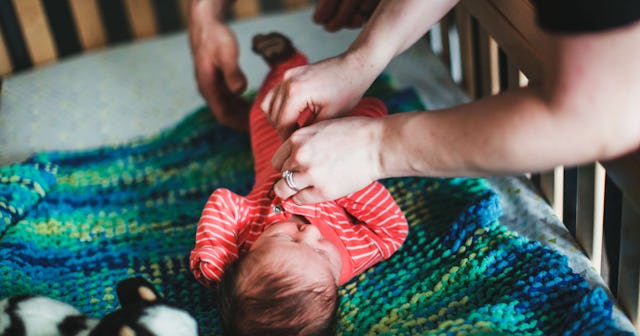Having Helpful Partners During Childbirth Recovery Improves New Moms' Health

The U.S. could learn a thing or two from Sweden when it comes to the proper care of postpartum mothers
Those first few weeks after a new mother gives birth are an undeniable whirlwind of physical recovery, hormone spikes and crashes, exhaustion, and the anxiety of having to adapt to this massive life change in the blink of an eye. A new study has found a way to improve the postpartum health of new mothers — give the non-birth partner paid parental leave.
Even though our bodies go through the genital and abdominal equivalent of being hit by a tractor trailer, not to mention the dramatic spiral of our mental health, the postpartum period is usually one new mothers navigate solo, medically speaking. We don’t see doctors until six weeks after delivery, aside from our newborns’ pediatricians. The biggest thing everyone seems to forget once the baby is birthed safely? NEW MOMS NEED SUPPORT.
Enter Sweden, one of several European countries that has its collective shit together when it comes to postpartum parental needs. The study, conducted by Maya Rossin-Slater and Petra Persson, both Stanford economists, focused on the effects of a 2012 Swedish law that allows dads to take up to 30 days as needed in the year after birth — all while the mom is still on leave.
Here’s what they found.
- In the first six months postpartum, there was a 26 percent decrease in anti-anxiety prescriptions compared with moms who gave birth before the policy went into effect.
- There was a 14 percent reduction in hospitalizations or visits to a specialist.
- There was an 11 percent decrease in antibiotic prescriptions for new moms.
Why? Because with proper support, moms can focus on their new babies and their own needs. And you better believe we’ve got a lot of needs post-birth. With a supportive partner at home and no financial worries about them going unpaid, new moms are likely able to make and attend appointments for their own physical and mental health because the other parent is there to care for the baby. GET WITH IT, AMERICA.
“A lot of focus has been on what we can do in the hospital immediately following childbirth, but less on mothers’ home environment, which is where the vast majority of women spend most of their postpartum time,” Ms. Rossin-Slater tells The New York Times. “What we’re saying is one important component of that home environment is the presence of the father or another adult caretaker.”
Personally, I can barely remember most details of my first week home after giving birth to my oldest daughter. But what I vividly recall was the severe postpartum anxiety that hit like a freight train somewhere around day three or four, and absolutely dreading every minute leading up to my husband’s return to work — which was only six days after she was born. I was flailing. Big time. And I had no one I felt I could trust with a.) the care of my new baby, and b.) to help me navigate my emotions. It was awful.
The United States is the only wealthy country without mandated paid leave. The American maternal mortality rate — which includes childbirth-related deaths in the year after birth — has increased 50 percent in a generation. Even though most maternal deaths are preventable, according to the CDC.
What Sweden gets very, very right is that their policy allowed new fathers to take intermittent, unplanned days of paid leave. Because as any working parent knows, things can take a turn without any warning. The data used in the study showed that fathers often used their leave on days mothers sought health care.
Moms need thorough, accessible, proper care after delivering a child — not just the babies, though they obviously benefit immensely from their mothers getting quality care. And it looks like moms do better mentally and physically when they have a supportive adult at home to help them through the postpartum recovery period.
Do better, America. Our lives literally depend on it.
This article was originally published on